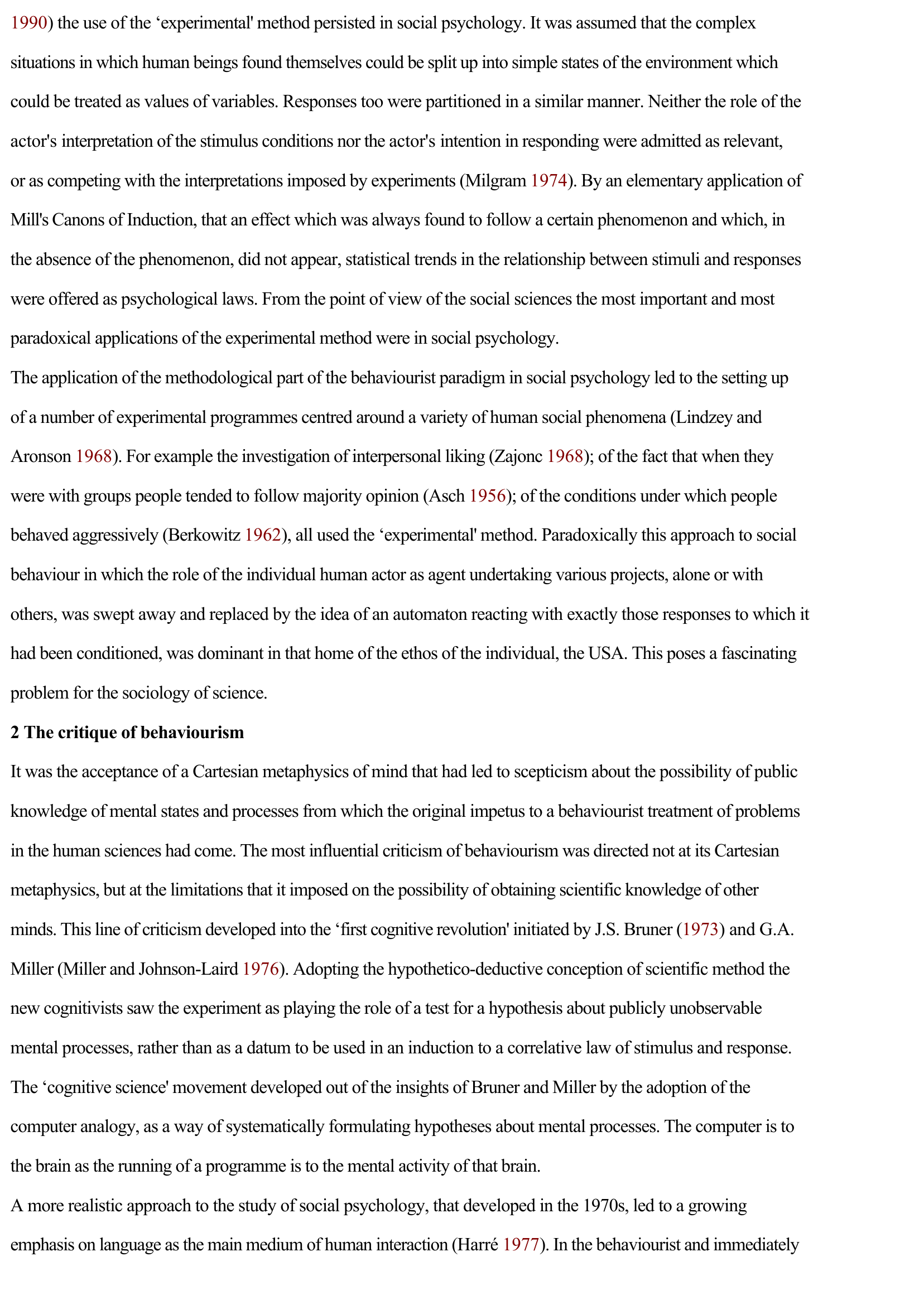Behaviourism in the social sciences
Publié le 22/02/2012
Extrait du document
«
1990 ) the use of the ‘experimental' method persisted in social psychology.
It was assumed that the complex
situations in which human beings found themselves could be split up into simple states of the environment which
could be treated as values of variables.
Responses too were partitioned in a similar manner.
Neither the role of the
actor's interpretation of the stimulus conditions nor the actor's intention in responding were admitted as relevant,
or as competing with the interpretations imposed by experiments (Milgram 1974 ).
By an elementary application of
Mill's Canons of Induction, that an effect which was always found to follow a certain phenomenon and which, in
the absence of the phenomenon, did not appear, statistical trends in the relationship between stimuli and responses
were offered as psychological laws.
From the point of view of the social sciences the most important and most
paradoxical applications of the experimental method were in social psychology.
The application of the methodological part of the behaviourist paradigm in social psychology led to the setting up
of a number of experimental programmes centred around a variety of human social phenomena (Lindzey and
Aronson 1968 ).
For example the investigation of interpersonal liking (Zajonc 1968 ); of the fact that when they
were with groups people tended to follow majority opinion (Asch 1956 ); of the conditions under which people
behaved aggressively (Berkowitz 1962 ), all used the ‘experimental' method.
Paradoxically this approach to social
behaviour in which the role of the individual human actor as agent undertaking various projects, alone or with
others, was swept away and replaced by the idea of an automaton reacting with exactly those responses to which it
had been conditioned, was dominant in that home of the ethos of the individual, the USA.
This poses a fascinating
problem for the sociology of science.
2 The critique of behaviourism
It was the acceptance of a Cartesian metaphysics of mind that had led to scepticism about the possibility of public
knowledge of mental states and processes from which the original impetus to a behaviourist treatment of problems
in the human sciences had come.
The most influential criticism of behaviourism was directed not at its Cartesian
metaphysics, but at the limitations that it imposed on the possibility of obtaining scientific knowledge of other
minds.
This line of criticism developed into the ‘first cognitive revolution' initiated by J.S.
Bruner ( 1973 ) and G.A.
Miller (Miller and Johnson-Laird 1976 ).
Adopting the hypothetico-deductive conception of scientific method the
new cognitivists saw the experiment as playing the role of a test for a hypothesis about publicly unobservable
mental processes, rather than as a datum to be used in an induction to a correlative law of stimulus and response.
The ‘cognitive science' movement developed out of the insights of Bruner and Miller by the adoption of the
computer analogy, as a way of systematically formulating hypotheses about mental processes.
The computer is to
the brain as the running of a programme is to the mental activity of that brain.
A more realistic approach to the study of social psychology, that developed in the 1970s, led to a growing
emphasis on language as the main medium of human interaction ( Harré 1977 ).
In the behaviourist and immediately.
»
↓↓↓ APERÇU DU DOCUMENT ↓↓↓
Liens utiles
- Matrix Theory and Linear Algebra I INTRODUCTION Matrix Theory and Linear Algebra, interconnected branches of mathematics that serve as fundamental tools in pure and applied mathematics and are becoming increasingly important in the physical, biological, and social sciences.
- Ideology and Rationality in the History of the Life Sciences
- A Propos Dickens: Charles John Huffam Dickens pen-name "Boz", was the foremost English novelist of the Victorian era, as well as a vigorous social campaigner.
- Clash of the titans: Email v social media résumé
- Popular and Social Dance I INTRODUCTION The Cakewalk The cakewalk, a dance of African American origin, was intended to lampoon high-strutting whites at fancy dress balls.

































